|
Christian Medal
Prophet Johan by Michelangelo
1970 Proof Silver Medal 44mm (40.99 grams)
Scene of Prophet Jonah from the Sistine Chapel fresco.
– The Prophet Johan – Risen from the whale’s belly, Jonah is the prophet of the Resurrection
EDGE LETTERING: STERLING 10382 THE GENIUS OF MICHAELANGELO-5
You are bidding on the exact item pictured, provided with a Certificate of Authenticity and Lifetime Guarantee of Authenticity.
Click here to see all Christian Medals and Objects for Sale

The Prophet Jonah is one of the seven Old Testament prophets painted by the Italian High Renaissance master Michelangelo (c. 1542–1545) on the Sistine Chapel ceiling. The Sistine Chapel is in Vatican Palace, in the Vatican City.
This particular fresco is painted above the High Altar, as the person of Jonah is of prophetic significance in Christianity. Behind the figure of Jonah, Michelangelo has painted a large fish, a reference to the fact that in the Book of Jonah, Jonah is swallowed by a whale.
Jonah or Jonas (Hebrew: יוֹנָה, Modern Yona, Biblically transliterated Yonah, Tiberian Yônā; dove; Arabic: يونس Yūnus, Yūnis or يونان Yūnān ; Latin: Ionas) is the name given in the Hebrew Bible (Tanakh/Old Testament) to a prophet of the northern kingdom of Israel in about the 8th century BCE. He is the eponymous central figure in the Book of Jonah, in which he is swallowed by a fish. The biblical narrative of Jonah is repeated, with a few notable differences, in the Quran.
Jonah in the Hebrew Bible
Jonah is the son of Amittai, and he appears in 2 Kings as a prophet from Gath-Hepher, a few miles north of Nazareth. He is therein described as being active during the reign of the second King Jeroboam (c.786–746 BCE), and as predicting that Jeroboam will recover certain lost territories.
Jonah is the central character in the Book of Jonah. Commanded by God to go to the city of Nineveh to prophesy against it “for their great wickedness is come up before me,” Jonah instead seeks to flee from “the presence of the Lord” by going to Jaffa, identified as Joppa or Joppe, and sailing to Tarshish. A huge storm arises and the sailors, realizing that it is no ordinary storm, cast lots and discover that Jonah is to blame. Jonah admits this and states that if he is thrown overboard, the storm will cease. The sailors try to dump as much cargo as possible before giving up, but feel forced to throw him overboard, at which point the sea calms. The sailors then offer sacrifices to God. Jonah is miraculously saved by being swallowed by a large fish in whose belly he spends three days and three nights. While in the great fish, Jonah prays to God in his affliction and commits to thanksgiving and to paying what he has vowed. God commands the fish to spew Jonah out.
God again commands Jonah to visit Nineveh and prophesy to its inhabitants. This time he goes and enters the city, crying, “In forty days Nineveh shall be overthrown.” After Jonah has walked across Nineveh, the people of Nineveh begin to believe his word and proclaim a fast. The king of Nineveh puts on sackcloth and sits in ashes, making a proclamation which decrees fasting, sackcloth, prayer, and repentance. God sees their repentant hearts and spares the city at that time. The entire city is humbled and broken with the people (and even the animals) in sackcloth and ashes. Even the king comes off his throne to repent.
The ancient port of Jaffa (Today Tel Aviv-Yafo) —where, according to the Bible, Jonah set sail into the Mediterranean Sea before being swallowed by a fish
Displeased by this, Jonah refers to his earlier flight to Tarshish while asserting that, since God is merciful, it was inevitable that God would turn from the threatened calamities. He then leaves the city and makes himself a shelter, waiting to see whether or not the city will be destroyed. God causes a plant (in Hebrew a Kikayon) to grow over Jonah’s shelter to give him some shade from the sun. Later, God causes a worm to bite the plant’s root and it withers. Jonah, now being exposed to the full force of the sun, becomes faint and desires that God take him out of the world.
And God said to Jonah: “Art thou greatly angry for the Kikayon?” And he said: “I am greatly angry, even unto death.”
And the LORD said: “Thou hast had pity on the gourd, for which thou hast not laboured, neither madest it grow, which came up in a night, and perished in a night;
and should not I have pity on Nineveh, that great city, wherein are more than sixscore thousand persons that cannot discern between their right hand and their left hand, and also much cattle?”
— Book of Jonah, chapter 4, verses 9-11
Jonah in the New Testament
Russian Orthodox icon of Jonah, 16th century (Iconostasis of Kizhi monastery, Karelia, Russia)
|
|
Oh Jonah!
“Oh Jonah!”, a Gospel music summary of the Book of Jonah, sung by the Golden Jubilee Quartet.
|
| Problems playing this file? See media help. |
On the Last Judgment fresco, Michelangelo depicted Christ below Jonah (IONAS) to qualify the prophet as his precursor.
In the New Testament, Jonah is mentioned in Matthew 12:38–41 and 16:4 and in Luke 11:29–32. In the Gospel of Matthew, Jesus makes a reference to Jonah when he is asked for a sign by some of the scribes and the Pharisees. Jesus says that the sign will be the sign of Jonah: Jonah’s restoration after three days inside the great fish prefigures His own resurrection.
39He answered, “A wicked and adulterous generation asks for a sign! But none will be given it except the sign of the prophet Jonah. 40For as Jonah was three days and three nights in the belly of a huge fish, so the Son of Man will be three days and three nights in the heart of the earth. 41The men of Nineveh will stand up at the judgment with this generation and condemn it; for they repented at the preaching of Jonah, and now something greater than Jonah is here.”
— Gospel of Matthew, 12:39–41 (New International Version)
Both Matthew and Luke in their gospels assert in parallel wording that Jesus is greater than Jonah and greater than Solomon.
|









_-_Jonah_and_Jesus.jpg/220px-Last_Judgement_(Michelangelo)_-_Jonah_and_Jesus.jpg)





